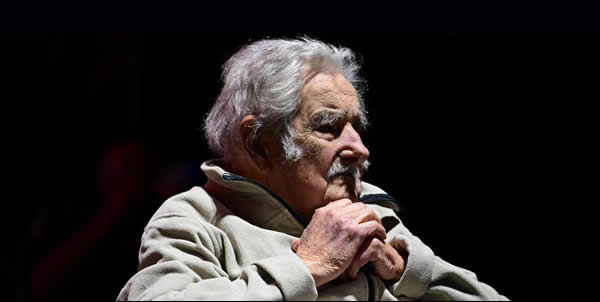Proyecto Patrimonio - 2025 | index | Cristóbal Hasbun | Autores |
Mujica, the stoic
Cristóbal Hasbun
Tweet .. .. .. .. ..
But whatever you do, get back from the body to the mind as soon as possible. Do this exercise day and night. It is a form of exercise against which cold and heat, even age, are no obstacle. Cultivate a good that the very passage of time
will improve (Seneca, Letters of a Stoic, XV).
Pepe Mujica announced a few months ago that he is suffering from esophageal cancer. The news is worrisome, because little by little the speech and practice, rigorous and simple, of a man who has spoken to the world with so much truth that it is difficult to forget what he says. He has been a politician without the grandiloquence of a politician. He taught, at least in the last years of his career, that there is a place beyond politics, where one can talk -listen attentively and speak- and that in today's world this is the first act of revolution and refuge. It is possible to listen to hours of his speeches or be entertained by the works of his biographers. The 89-year-old man who is now ill in his modest cottage in the country communicated many things as do the masters who carry a light of goodness quickly distinguishable.
There is something in the speeches he gave at the UN, international summits or in the parliaments of several countries that I would not like to overlook. It is the references to the Stoics that the former President used to make in his speeches or interviews. I am referring to the nuclear idea behind his oratory, from which hang various threads of his thought, discourse and life practices. This point is the following: it is urgent to return to philosophy in its classical sense and review our way of living. A radically austere content, full of meaning. It is not a meandering or convoluted message, filled with ulterior motives or aggressive ambiguities as some of his colleagues' preaching tends to be. It is simply the learning of someone who spent thirteen years behind bars and who, when he came to power, used it to communicate his teachings internationally as a way to get rid of power itself, which, as he well knows, is a mirage. Power is one more obstacle to serenity.
When Mujica suggests that nowadays it is necessary to return to philosophy, citing, among others, Seneca -a reference used with a reader's conscience, not as a mechanism for self-importance- he is stating a truth that deserves to be disseminated. This truth is that it is necessary to philosophize in the classical sense of the term, that is, to think about how it is desirable and good to live before life escapes us. To be content with ourselves in order to bring out the best in others. This is valuable because it is perhaps one of the last revolutionary legacies of the former President: philosophy, unlike what many of the thinkers of the last and current century think, does have the purpose that men and women can be better people. So that we can evolve. And it becomes essential to reflect once again on who we are, what we understand by civilization and how we want to live in society.
Mujica is the farmer who reminds us that joy is in the earth, the earth that lies between the fingers of our hands and provides us with minerals, where truly human contact remains and takes refuge. His words return us to the simple path of philosophy understood as the search for wisdom, where the true task lies in knowing oneself and learning to live. He neither wanted nor intended to present himself as a connoisseur of the diatribes of contemporary philosophy or sociology. Mujica said: Seneca. He put together a skirmish of words in the face of the society of consumption and emotional isolation. Because, as he says, we have not understood the deep meaning of what civilization means.
With his unalterable peasant accent, even today he still defends the identity of what rampant globalization has not been able to erase: the identity of the peoples who resist in their traditions, that creative and deep-rooted language of the common people, that modest way of being when approaching others. It exalts the people who, without fuss, communicate: “we are neither more nor less than this, but what does it matter, I am willing to meet you”. His quiet pace of life, able to resonate with the frequency of the content and beauty of his surroundings, challenges the very foundations of our fast-paced society, where we experience every moment with seconds of delay.
The former President is ill and from his little house in the countryside he still talks to us while he caresses a sleeping animal and cultivates the land. He struggled throughout his life to achieve political power, but when he had it, he preferred to leave it in the background, preferring to teach and talk. He participated in the guerrilla, he was wounded, he was in jail, he reformed himself… His way of sipping mate resonates in his followers. Mujica, the peasant, friend of his friends, endures as a sphinx of granite and stone that embodies the need to stop, go back to the mind and think about how we live.
Proyecto Patrimonio Año 2025
A Página Principal | A Archivo Cristóbal Hasbun | A Archivo de Autores |
www.letras.mysite.com: Página chilena al servicio de la cultura
dirigida por Luis Martinez Solorza.
e-mail: letras.s5.com@gmail.com
Mujica, the stoic
Cristóbal Hasbun

